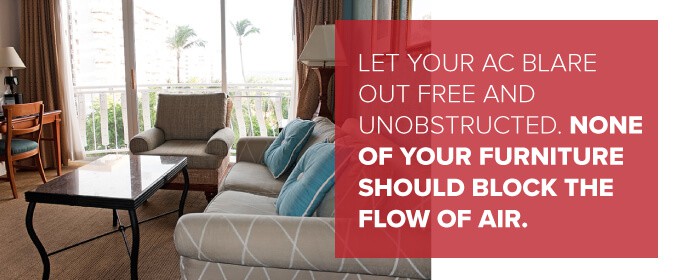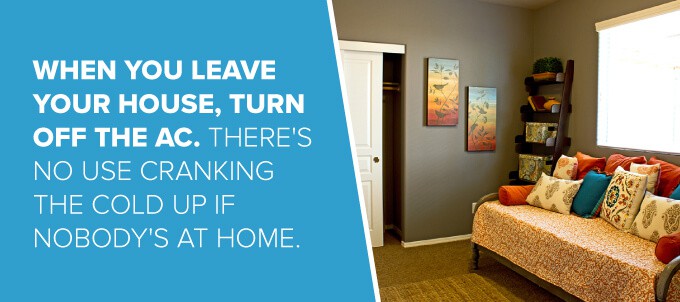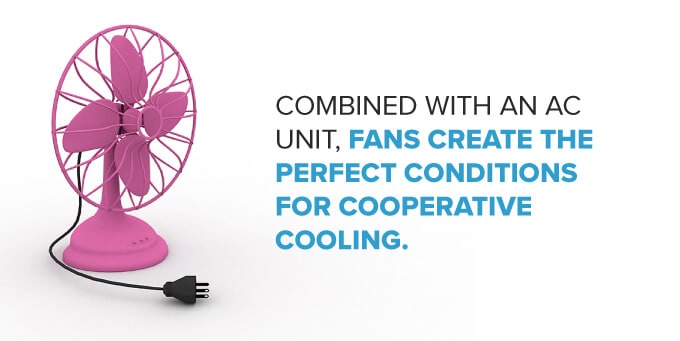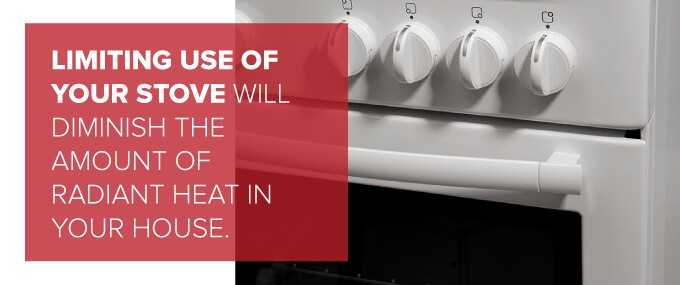Before you curse the name of summer, there’s easy relief in sight. We at Home Climates know how to slam the door on inescapable heat. We’ve laid out some simple tricks to keep your residence cool without freezing up your bank account. Air conditioning units can drain your wallet and make a racket. Don’t give those expensive, noisy houseguests free reign in your home. Instead, consider our list of cheaper, more ingenious solutions.
Tips to Keep Your House Cool On a Budget
Don’t hate on the summer heat. Keep your head cool with these proven ways to hack the heat:
Keep Furniture Clear
Let your AC blare out free and unobstructed. None of your furniture should block the flow of air. How’s an AC unit going to help if it’s behind a couch? Move that sofa. Get the air circulating. If you insist that your furniture stay put, small plastic vents can redirect the air flow up. Unless shifting that couch will upset your living room feng shui, get that furniture moved.
Leave the AC Off at Night
If you happen to rely on an air conditioner, you’ll need to feed it electricity. AC units are energy-hungry beasts. To help curtail your utility bill, switch the AC down, or even off, at night. Prepare by lowering it an hour or two before bed. Nighttime temperatures usually drop, so open the window and let the nocturnal breeze drift you to sleep.
Use Smaller Units
Bigger isn’t always better. A larger electrical bill from a colossal AC unit will weigh you down. Unless you’re migrating through every room, maybe avoid cooling the whole house. Settle down in a room with a portable AC unit and create a mini-oasis, without wasting electricity. Many small AC units use half the power of their bigger counterparts. Opt for a smaller unit and avoid unnecessary cooling.
Ensure Maximum AC Functionality
Air conditioners require upkeep. If you rely on AC, make sure it can rely on you. Your AC unit needs your help to keep on spewing that crisp conditioned air. Not only will filthy filters decrease your unit’s ability to work its magic, it will also eat up more energy and pump out dirty air.
Cleaning the filter prevents the AC from becoming an airborne dust machine. Thankfully, maintaining you AC isn’t hard. In the school of AC maintenance, there’s several lessons:
- Clean Your AC’s Filters. Don’t let your AC get green around the gills. Open up the system, take out the filter and check for damage which might necessitate a replacement. Vacuum out all the gunk without ripping the filter, soak the filter in an equal part vinegar and water emulsion to kill any bacteria and let them relax in their bath for a couple hours. Then, remove the filters. Don’t rinse them with water, simply let them air dry and put them back in the unit.
- Book a Checkup. Yes, owning an AC unit and a corporal body both require annual checkups. It’s a wise choice to get a professional to examine your AC unit, especially if you have a central air conditioning system. At least once a year, enlist an expert’s advice on your AC. Let them tinker around and see what they find. Any problems left unchecked will lead to a malfunctioning AC unit.
- Avoid Leaky Ducts. Managing the network of conduits for your central air conditioning system requires a keen eye and a trusty roll of duct tape. You want air emerging from all the right places. Unfortunately, ducts get old and begin to leak. Check the integrity of the ducts and repair any holes you encounter. Your ducts likely course through your attic or basement. Make sure no precious cold air seeps out in undesirable places. Don’t refrigerate your attic.
Don’t Cool an Empty House
This tip won’t surprise you. When you leave your house, turn off the AC. There’s no use cranking the cold up if nobody’s at home. When you’re darting out to work, remember to flick that switch.
If you prefer, turn the dial down. Simply turning the dial to 85 degrees will drastically reduce the electrical consumption of your AC. This tactic also prevents your AC from battling to regain your desired temperature. You may return home to a sauna, but at least you saved power. You also prolong the longevity of your unit by curtailing its output. Once you come home, just power the AC back on, and let it work its magic.
Preprogram Your Thermostat
Most central air conditioning systems include programmable thermostats. This permits the freedom of not needing to constantly obsess over adjusting the temperature based on your schedule. For instance, customize the thermostat to follow your lifestyle. You can program the AC to:
- Shut off at night
- Turn on before breakfast
- Turn down again when you dart off to work
- Come back on, just before you come home
This amazing feature lets you forget the nuisance of monitoring the constant temperature. Set the dial to reasonable degrees of fluctuation and put your mind at ease.
Choose Your Optimal Temperature
Experiment with fine-tuning the exact temperature to establish as a default. Start with an objective setting, and fiddle around by shifting the degree up or down until you’re satisfied. Start at around 77 degrees and see if you can tolerate a higher setting. Every subsequent degree which you accept will yield savings on your electric bill.
Close the Blinds
When the sun’s rays begin to radiate your home like a microwave, shut the curtains, close the blinds or put up an awning. Prevent that cascade of sunlight from flooding through your windows, using any method you devise.
Don’t let your home become a blistering greenhouse. Cut back on direct sunlight and you’ll naturally reduce the heat within your home. This tactic also eases the load on your AC, saving energy and money.
Secure Your Ventilation
Cold air sinks. Leaving floor vents open will drain the cold air from a room. The basement doesn’t need any more cool air, so lock up any downward path that air might find. If you forgot to latch the vents, then follow the next tip.
Chill Out in Your Basement
A basement offers a glacial gift to anyone fleeing the heat. You’ve tried life on the surface world – why not move underground? Before you move your bed down there, experiment with a couch and flat-screen TV. Dust off that old sofa, get a mini-fridge and with a little luck, you’ll transform your basement into a perfect subterranean paradise.
It’s the coldest part of the house, so take a trip downstairs. All the heat from your open vents migrated down there already, so cut your losses and get comfy in the basement of your dreams. It might not possess the prestige of a living room, but at least it’s nice and cool.
Fan of Fans
It never hurts to augment the cooling power of AC with a room fan. Ceiling fans represent a beloved permanent fixture, but a trusty portable fan also works wonders. Fans increase general air circulation, preventing air from stagnating and accumulating unwanted heat. Combined with an AC unit, fans create the perfect conditions for cooperative cooling.
The shifting currents of air also offer a biological advantage to natural cooling. Dynamic air movement increases the amount of sweat which evaporates off your skin. Employ your body’s natural cooling system. Let a breeze carry away the heat trapped on your skin through evaporation.
Putting ice cubes behind the fan gives some extra oomph to the air. Try tying them up in a zip-top bag and dangling them behind the fan’s intake.
Fans drain less power than an AC, so lighten the load on your AC units by bringing a fan into the equation. Turn down the AC, position fans where needed and bask in the cool confidence of saving electricity and money.
Cooling Packs
A freezer pack placed in contact with your body can drastically reduce your temperature. Kick it old school with an ice pack if you can tolerate the chill. Otherwise, products such as ergonomic neck-fitting cooling packs may suit your style. Of course, a cold washcloth on your nape or forehead works fine, too.
Another creative solution involves putting slightly moist socks in the freezer. Make sure they don’t freeze entirely or they won’t fit. Experiment with different solutions and find which works best for you.
Adjust AC Fan Speed
Humidity represents another factor to consider. On low humidity days, let your AC fan blast. The fast cycle will cool the air without concern for heat-trapping water vapor. Don’t worry about those dry days of summer when it comes to fan speed.
However, humid days present a challenge. Moisture carries unwanted heat and presents an added challenge for AC units. For humidity, turn down the fan speed on your AC. The slower processing rate within the unit allows for increased cooling to transpire. This allows the AC to spend more time cooling the additionally hot and humid air.
Popsicles and Cool Drinks
Popsicles and drinks offer a refreshing solution for cooling down. For those moments when the heat seems just too hot, grab a cool treat from the freezer or fridge. Go ahead, indulge. We won’t tell your dietician.
Reduce Stove Use
The stove presents a source of excessive household heat. If you want to make a pie, great! Just don’t complain when your kitchen becomes an oven itself. In your battle against the summer heat, don’t add fuel to the fire.
Limiting use of your stove will diminish the amount of radiant heat in your house. For those exceptionally hot days, stick to using the microwave, or better yet, break out the grill. Nothing tops a backyard barbecue in shorts and T-shirt with a cold drink in hand.
Take a Cold Shower
Getting a little hot-headed? Jump in a cold shower or draw a bath. Wash away all that gushing sweat and cool down on the double. If you’ve already rinsed off, keep a spray bottle of iced water handy. Simply spraying your face with a mist of cooling water will undermine that ever-present heat.
Cost-Effective Alternatives to Air Conditioning
A major downside to running your AC concerns the hefty price tag. Building up your electric bill weights down your wallet. We’ve covered some helpful tips to cut back on AC and incorporate alternative strategies into your arsenal of heat beating tools, but some cost-saving alternatives to AC do exist.
Geothermal Cooling Systems
Geothermal cooling technology offers a cost-effective alternative to air conditioning. A growing number of homeowners see geothermal as the best solution to their long-term needs.
Looking around your home, you might think there’s nothing cold in sight. You’re only half right. Below your house lies an endless reservoir of cold energy. The ground doesn’t absorb any of the sun’s heat, and therefore stays cool all summer long.
If only you could access the free power of the cold ground. Well, geothermal systems let you steal that coldness right from the Earth.
Geothermal consultations in central pa
How Geothermal Systems Work
At Home Climates, we specialize in tapping geothermal cold energy. We simply install pipes 300 feet below your home. Then, we fill those pipes with water and attach a pump which circulates the ground-cooled water into your home, cooling down the air.
The water becomes heated by the air in your home, and is pumped back down to cool off before returning. This process creates an optimally cold environment in your house.
Long-Term Cost Benefits of a Home Climates Geothermal System
Once installed, say goodbye to your electricity-guzzling AC unit. The geothermal system runs on a fraction of the energy of AC. In 10 years, the cost of installation gets surpassed by all money you save on electric bills. You’re cruising on cold savings.
The geothermal system also taps the naturally hotter energy of the ground in winter, so you can ditch your heat system too. With this double advantage, you only increase your savings.
This all-natural alternative to those loud, costly devices knows as air conditioners has many people joining the geothermal movement. Going green can save money.
You might also save money on electric bills depending on your home’s location. Get in touch with your local power provider to investigate what options are available.
Get your system now and take advantage of a federal tax credit which covers 30 percent of the installation fee. Contact us today to see how we can help cool your home and save you money.













